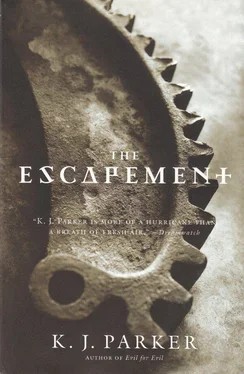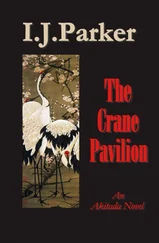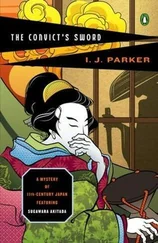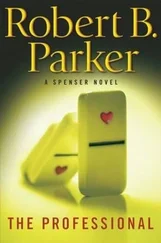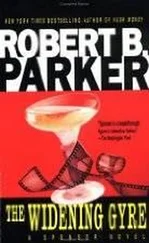K Parker - The Escapement
Здесь есть возможность читать онлайн «K Parker - The Escapement» весь текст электронной книги совершенно бесплатно (целиком полную версию без сокращений). В некоторых случаях можно слушать аудио, скачать через торрент в формате fb2 и присутствует краткое содержание. Жанр: Фэнтези, на английском языке. Описание произведения, (предисловие) а так же отзывы посетителей доступны на портале библиотеки ЛибКат.
- Название:The Escapement
- Автор:
- Жанр:
- Год:неизвестен
- ISBN:нет данных
- Рейтинг книги:4 / 5. Голосов: 1
-
Избранное:Добавить в избранное
- Отзывы:
-
Ваша оценка:
- 80
- 1
- 2
- 3
- 4
- 5
The Escapement: краткое содержание, описание и аннотация
Предлагаем к чтению аннотацию, описание, краткое содержание или предисловие (зависит от того, что написал сам автор книги «The Escapement»). Если вы не нашли необходимую информацию о книге — напишите в комментариях, мы постараемся отыскать её.
The Escapement — читать онлайн бесплатно полную книгу (весь текст) целиком
Ниже представлен текст книги, разбитый по страницам. Система сохранения места последней прочитанной страницы, позволяет с удобством читать онлайн бесплатно книгу «The Escapement», без необходимости каждый раз заново искать на чём Вы остановились. Поставьте закладку, и сможете в любой момент перейти на страницу, на которой закончили чтение.
Интервал:
Закладка:
"And you believe," he said, "that these sheds are where Vaatzes is building the siege engines."
"It seems likely." Phryzatses settled back into his chair. It was a perfect fit, tailored. "That's only an inference, of course, drawn from the proximity of the existing waterwheels at Nine, the furnace complex at Five"-oh, I see, Psellus realised, he's talking about the little numbers drawn on the map-"and the barracks at Three. As to whether production is actually under way, I have no information as yet. The sheds would appear to be complete, but it seems logical to suppose that it will take him a while to set up his production line. How long exactly, we can't really say. Here in the City, it could easily take six months. But we know that Vaatzes has the ability to do these things remarkably quickly. Note also," he went on, "how close the sheds are to the river; this will make it possible for him to ship in materials by barge."
Psellus frowned. "Oh," he said. "But surely not, the water-mills are in the way."
"I don't think so."
"But… Oh, I see, the river flows down the page, not up. No, that can't be right, or it'd be flowing uphill. Here, look-I take it these little lines mean a hill?"
"That's correct, yes." Phryzatses was scowling at the map. "Yes, you're right. The current must run east-west."
"You don't…" Psellus didn't say the rest of it: you don't actually know, you haven't actually been there yourself. Well, why should he? It didn't matter, after all. But for some reason he felt surprisingly disappointed. "I'm only guessing the mills are big enough to block the river," he heard himself say. "You might get that checked, if you wouldn't mind."
Curt nod (he doesn't like being found out, Psellus guessed).
"It's actually quite important," Psellus went on, "because the ambassador is talking about trying to get his men in there by water, rather than on foot. He doesn't think there'd be much hope of getting there from the south; coming down through the forest from the north would be better, but even so he's afraid his people would be seen by the logging teams on their way. But if they could float right up to the sheds on barges, he feels they're in with a chance, of sorts. Hence," he went on with a smile, "we do need to know which direction the river runs, and since we don't seem to have any other reliable maps…"
"Understood," Phryzatses said. "I'll see to it." He hesitated, then added: "I should point out that we don't actually know these sheds are where the engines are going to be built, it's just a supposition at this point. I wouldn't want-"
Psellus nodded. "Quite," he said. "But obviously he needs large buildings to make the engines in, and you tell me there aren't any others that'd be suitable. So it must be these."
"It would appear likely, yes."
It would appear likely; but of course, that's one of the tiresome things about war. So much guesswork and supposition, when it'd be so much more civilised to write the enemy a polite letter and ask him if the sheds really are his arms factory. Even more civilised, of course, and hugely more sensible not to have a war at all. "Let's hope you're right," he said wearily. "They may be Cure Doce, but they're the only soldiers we've got. The days when we could afford to be extravagant with our armies because there's always plenty more where they came from are over, I'm sorry to say. Still, I'm sure you've done everything possible, so we'll leave it at that. Just find out about the river, please, if you could. How long will that take, do you think?"
When Phryzatses had gone, Psellus sat and stared at the map for a long time, screwing up his eyes to read the little numbers, and looking them all up in turn in the key at the bottom. He tried to distil the lines and colours into a picture, but he couldn't. Hardly surprising, he told himself. Apart from his visit to Civitas Vadanis, he'd only been out of the City a few times in his life, and never so far that he couldn't see the top of the gatehouse towers in the distance. Great rivers, hidden valleys, forests-he believed in them, the same way men believed in gods they knew they'd never see, but his imagination skated off them, like a file off hard steel.
Later that evening, he sent for the Cure Doce ambassador, showed him the map, promised him a copy by morning, and gave the formal order to proceed with the raid. Afterwards, he walked slowly down the hundred and seven granite steps from the reception rooms to the courtyard. It was a clear night, and the stars were shining; their light shocked him, and for a moment he had an unaccountable feeling that they were falling down on him, like snow, or the shining heads of a volley of arrows.
4
Linniu Matsinatsen was the eldest son of a fairly large farm in the Goinsolinnsa valley, the soft, misty heart of the rambling Cure Doce country. He was nineteen years old, which meant he knew how to plough and harrow, cut and stack hay, feed and herd cattle, carry water, castrate and dehorn the young bullocks, plane and mortice wood and forge nails; in a few years' time, he'd inherit the duties of pruning the fruit trees, looking after the bees, cutting the bracken for winter bedding, taking the pigs to the wood in acorn season and raising and killing the geese. After that, nothing would change until his father got old, at which point he'd take over the sowing and the harvest, slaughtering, malting, and the rest of the major work, subject to his father's instructions as to when, where and how. By then, of course, he'd have a son of his own, who'd start with feeding the poultry and slowly work his way up. Before the summons came, he'd never been more than seven miles from the farm, and he could remember the names and faces of everybody he'd ever met.
Now he was an archer in the People's Defence Force. He wasn't quite sure why; it was something to do with a vast army of savages who'd burst out of some place he'd never heard of and were planning to destroy the great city of Mezentia, where the axe-blades, hammerheads, saws, chisels, kitchen knives and needles came from, and this clearly couldn't be allowed to happen. Why this was clear he didn't know and didn't like to ask.
Being a soldier was something he'd dreamed about, needless to say. His uncle Loimen had been a soldier, for a month, thirty years ago. Loimen was older than Father, who'd been too young. He'd gone with fifty or so other sons of other considerable farms to fight the Vadani duke over something to do with water, and it had been the turning point in his life, for several reasons. He'd been away from the valley, for one. This automatically made him the district's leading and only authority on world affairs, strange and obscure customs in foreign lands, medicine, history and geography. He'd acquired (accounts varied as to how) a vast treasure in gold, silver and bronze, looted from the dead: buckles, buttons, a penknife with stagshorn scales, a fork and two pairs of scissors, together worth more than forty pence, and this wealth had made it possible for him to buy the pedigree Swayback bull on which was founded the celebrated Matsinatsen herd. He still owned a genuine Mezentine sword, which hung in stupendous honour over his fireplace. Finally, he'd lost an eye, and three fingers from his left hand, which meant he'd forfeited the main farm when his father died, since he wasn't up to running it, and was packed off to Lower End.
Such an ambiguous precedent left Linniu feeling uncertain when the summons came, and his parents' reaction hadn't helped much to clarify his mind. Mother had burst into tears and declared that he couldn't possibly go; he'd die, or come back horribly mutilated, and then there'd be nobody to run the farm and they'd all starve to death and Rinoj would never get a husband and it was the end of the world. Father hadn't said anything much, but Linniu got the distinct impression that he was pleased, because once Linniu came back he'd be the soldier, with a sword of his own for the fireplace, and Loimen wouldn't be able to throw his useless weight around quite so much in future; also, if there was any vast treasure in gold, silver and bronze to be had (and to hear Loimen talk, all you had to do was bother to fill your pockets), he had plenty of ideas on what it could be spent on, starting with a thoroughbred boar and a new share for the second-best plough. As for getting killed: well, the world was a dangerous place, but only idiots like his brother let it hurt them.
Читать дальшеИнтервал:
Закладка:
Похожие книги на «The Escapement»
Представляем Вашему вниманию похожие книги на «The Escapement» списком для выбора. Мы отобрали схожую по названию и смыслу литературу в надежде предоставить читателям больше вариантов отыскать новые, интересные, ещё непрочитанные произведения.
Обсуждение, отзывы о книге «The Escapement» и просто собственные мнения читателей. Оставьте ваши комментарии, напишите, что Вы думаете о произведении, его смысле или главных героях. Укажите что конкретно понравилось, а что нет, и почему Вы так считаете.
